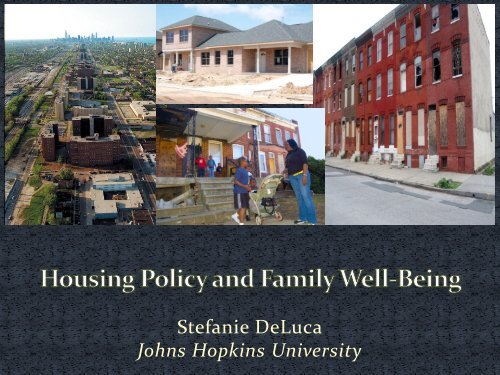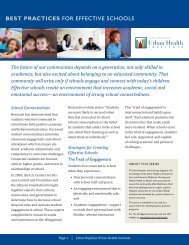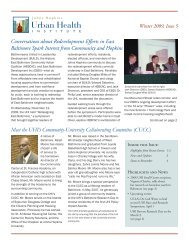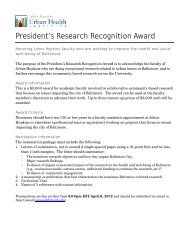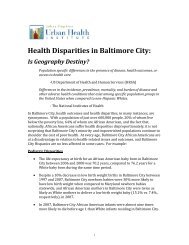American Neighborhoods - Urban Health Institute - Johns Hopkins ...
American Neighborhoods - Urban Health Institute - Johns Hopkins ...
American Neighborhoods - Urban Health Institute - Johns Hopkins ...
Create successful ePaper yourself
Turn your PDF publications into a flip-book with our unique Google optimized e-Paper software.
Stefanie DeLuca<br />
<strong>Johns</strong> <strong>Hopkins</strong> University
15 yrs, 500+ families, 3000+ hrs, 3 cities<br />
Residential biographies, mobility histories, family<br />
dynamics, finances, landlords, children’s schooling,<br />
substance use, health, mental health, friendships,<br />
employment, religion, aspirations<br />
Housing searches, churches, community meetings
Growing up in a neighborhood of<br />
concentrated disadvantage reduces the<br />
verbal cognitive score of African-<strong>American</strong> children,<br />
equivalent to missing 1 year of schooling<br />
The negative effects of living in neighborhoods<br />
of concentrated poverty accrue over time and can<br />
have devastating consequences for their odds of<br />
graduating from high school
Improved mental health for women<br />
Reduction in extreme obesity<br />
Decreased levels of diabetes<br />
Increased levels of happiness<br />
Increased housing quality and safety<br />
Reduction in neighborhood poverty<br />
Increase in access to higher quality schooling
That was the worst experience that I ever experienced,<br />
living in an environment which made you feel trapped,<br />
caged, and worthless, just stuck into the atmosphere of<br />
absolutely no progress. It was a whole little community<br />
of pure dissatisfaction in everything. No one encouraged<br />
no one.—Tammy<br />
[But] that’s one of the things that allowed me to<br />
continue to use drugs, ‘cause I was always looking at<br />
people that was worse than me, instead of looking at<br />
people that were better, that were doing better than<br />
me.—Rachel
I could see grass, and I could see trees and birds and<br />
squirrels. But [in the housing project], it wasn’t nothing<br />
like that…. I had moved from night to day. The [project]<br />
was not clean… And you know what, it gets better. It’s<br />
gonna get better.—Niecy<br />
So moving up here, it’s a whole different atmosphere, the<br />
greenery, you living in a high-rise, you got a lot [of]<br />
cement. And there’s something to that effect in the<br />
psychology…, the hardness you get from all that<br />
concrete. The greenery, it softens you. It’s just so<br />
beautiful and peaceful, the space, the open space. You<br />
got more space. –Amy
Fair Market Rents<br />
Source of Income Discrimination<br />
Time limits on vouchers<br />
Limited vouchers<br />
Lack of housing counseling<br />
Landlord practices
Most residential mobility among poor minority families is<br />
reactive<br />
Poor quality housing stock, landlords, family conflicts,<br />
neighborhood violence, housing policy regulations<br />
Moving under duress circumscribes neighborhood<br />
choice<br />
Results in repeated relocation to high poverty,<br />
segregated neighborhoods
1995 class action lawsuit<br />
Housing desegregation remedy<br />
Current and former public housing families<br />
Voucher to move to a census tract that is<br />
< 10% Poverty<br />
< 30% African-<strong>American</strong><br />
< 5% sub housing
Pre-Move Counseling<br />
Credit counseling, family needs referrals<br />
Move readiness preparation for private market<br />
Suburban neighborhood tours & education about housing<br />
Landlord Outreach in Suburban <strong>Neighborhoods</strong><br />
Post-Placement Counseling<br />
Multiple visits within first year<br />
Second Move Counseling<br />
Counseling on School Choices in New <strong>Neighborhoods</strong><br />
Parents are shown how schools compare across<br />
neighborhoods<br />
Staff work with parents to negotiate new school settings
Getting it right is critical<br />
Devaluing black communities<br />
Reality, politics, opportunity structure<br />
HUD’s current agenda<br />
Empirical scrutiny<br />
Sandtown-Winchester—70 million+ spent<br />
Aspen <strong>Institute</strong> has three volumes on ‘challenges’<br />
But we stand to learn as much from these about what<br />
matters
Need to preserve various options to provide<br />
housing in safe neighborhoods of opportunity<br />
Mobility programs are one option that gives families<br />
resources and choices they would not otherwise<br />
have<br />
Encourage policies that present options for families<br />
to learn about, access and experience an array of<br />
communities and neighbors<br />
Empirically demonstrated to improve the general<br />
well being of most (even some) of our cities’<br />
families and children.


